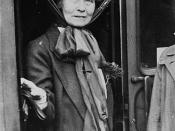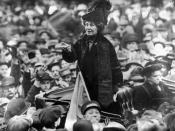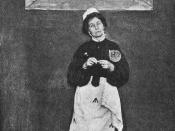Total War in the Twentieth century has proved to be an agency of social division rather than of national integration.
Total War has been described as war which "draws from every political, social, economic and cultural sphere of a nation state" . The first major example of this is the First World War. It is clear that this war changed society and had wide ranging effects on the nations directly involved in the war. However, the extent to which it divided society is an interesting topic of argument. While governments would look to advocate policies of national integration in order to maximise their resources in such a war of attrition, there are also examples of how social boundaries were extenuated. This occurs in terms of social class and also gender.
In Britain in particular the effects of war were massive. The unprecedented mobilisation of troops and draining of resources left the economy at home in ruins.
This only led to further division. With the economy stretched long term cutbacks were made in education and healthcare. These cutbacks had the greatest effect on the working classes and the poor. Before the First World War governments had brought about measures to alleviate social distress and to decrease class segregation. These measures included increases in funding for education. In March 1913 speeches from the throne had announced plans to increase grants to local education boards. This would have made education more accessible to the working classes. However, because of the economic cost of the war, pressure was put on local education boards to suspend school attendance by-laws. This move affected the poorest sections of society in particular as these were the families who had to send their children out to work because of the absence of the main wage earner in the family.


